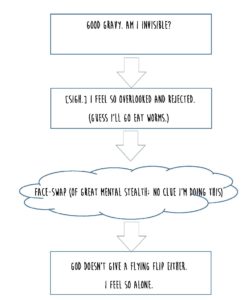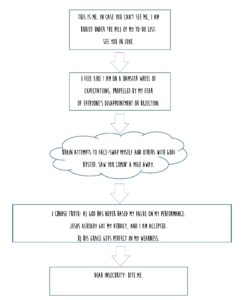To the untrained expatriate, swooping into American culture (like yours truly) I gotta say: Face Swap weirds me out a little. My family and I, piled on the sofa, have guffawed at, say, my daughter spontaneously sprouting my husband’s five-o’clock shadow. Or my seven-year-old swapping faces with the dog.
Still. Lately, what I’m realizing about my ideas of God?
He tends to change faces.
Spookier: The faces actually tend to eerily resemble my most influential relationships.
When I’m feeling cherished or people are lathering on the affirmation (one of my love languages), I feel embraced by God, too. But take those days when I feel overlooked, used, disrespected: I tend to suspect God shares that opinion. When expectations around me are high and the subculture driven, I tack those demands onto Him, as if my inferiority and insecurity were beaming straight from above.
Observe my possible mental flowchart:

Conclusions about this peculiar phenomenon:
- God is not the one changing. (I wrote awhile back that I also tend to change my opinions of Him based on whether I’m getting what I long for.)
- God does show Himself through His image expressed in people around me.
- I am pretty impressionable from my relationships. (Ya think?)
- None of those relationships express God clearly. (If I think they do—well, I put myself at further risk of making one sole person into the image of God for me. Only one person fits that description.)
- Some of my impressions of God can lean toward the dysfunctional because I—and my relationships—are dysfunctional.
But what if I spotted the Face Swap? What if I catch myself applying these fallible faces to the infallible? (Think the spiritual equivalent of, Gee. I don’t think that a nine-year-old girl actually has whiskers.) If I catch myself pasting someone else’s mug on God, I offer myself a choice to observe God as He is—not an image elaborately carved by my circumstances and responses.
Revised flowchart:

As much as I make light of this–there are profound implications to our human relationships coloring our perceptions of God. Take fathers: Our dads undoubtedly extend some of their own characteristics toward God. (After witnessing my husband’s and father-in-law’s quiet brand of fatherhood that so differed from my own dad’s exuberant role, my concept of God as Father widened markedly.) If significant relationships offered poor or inconsistent care, or if we’ve only experienced insecure, volatile relationships, God’s own faithfulness and intentional care may have a hard time materializing in our minds. We’re having to re-record the tapes that play over and over in our heads–which not only requires identifying the faulty tapes, but effectively reinstalling the right ones.
As 1 John poses it, No one has ever seen God; but if we love one another, God lives in us and his love is made complete in us.
It’s my job to consistently, intentionally ferret out the truth, teasing out the true God from imperfect human connection. God remains the same whether I am well-loved or forgotten, gathered in with open arms or left feeling powerless and rejected. Any Face Swaps are my own responsibility—because no matter how humans love me, I am irrevocably, unchangeably, and infinitely loved by God.
That means the hard part is not being loved by God, but believing it–and training my eyes to see Him as He is.
Like this post? You might like
Questions to Know Thy [Stressed] Self
The Necessity of Talking to Yourself (and not just listening)







